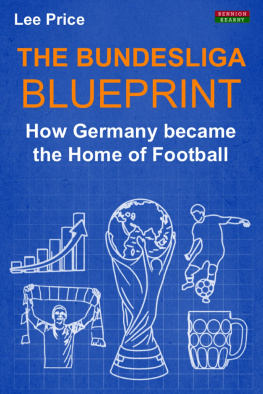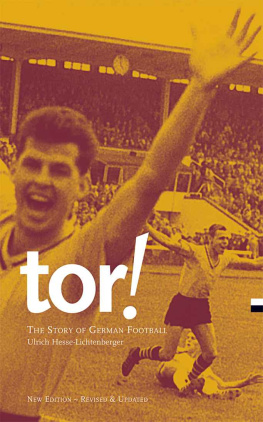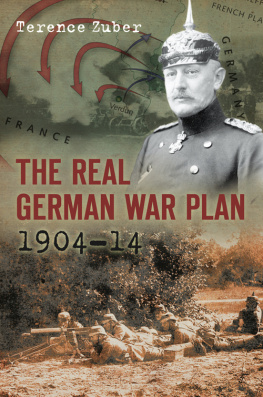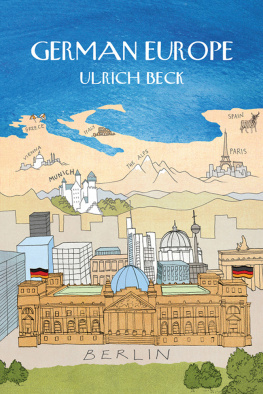The Bundesliga Blueprint: How Germany became the Home of Football
*
Lee Price
*
[Smashwords Edition]
*

*
Published in 2015 by Bennion Kearny Limited.
Copyright Bennion Kearny Ltd 2015
ISBN: 978-1-910515-46-4
All Rights Reserved. No part of this publication may be reproduced, stored in a retrieval system, or transmitted in any form or by any means, electronic, mechanical, photocopying, recording or otherwise, without the prior permission of the publisher.
This book is sold subject to the condition that it shall not, by way of trade or otherwise, be lent, re-sold, hired out or otherwise circulated without the publishers prior consent in any form of binding or cover other than that it which it is published and without a similar condition including this condition being imposed on the subsequent purchaser.
Bennion Kearny has endeavoured to provide trademark information about all the companies and products mentioned in this book by the appropriate use of capitals. However, Bennion Kearny cannot guarantee the accuracy of this information.
Published by Bennion Kearny Limited, 6 Woodside, Churnet View Road, Oakamoor, Staffordshire, ST10 3AE
www.BennionKearny.com
Table of Contents
About Lee Price
Lee Price is an award-nominated national print journalist and published sportswriter who is, and has always been, besotted with football.
He used to compile player lists and notes on his arms, clothes, school books and bedroom walls. Now, he does similar for a living.
Previously of Shoot! magazine, Lee has been a feature writer at The Sun since 2010, where he has interviewed various sporting greats - most memorably his original footballing hero, Eric Cantona, who was as aloof and enigmatic in a hotel lobby as he was on the pitch. And Lee was as infatuated.
Other objects of his footballing affection include the English lower leagues, Germany's fan model, the faint possibility of an England World Cup win, and a good old-fashioned unlikely success story.
Acknowledgements The People Who Made It Happen
I have to say thank you to a long list of people for helping me make this book a reality. Obviously, as an Englishman, I needed experts from within the German game to offer their insight and support, which the following did.
A big thank you to
Carolin Kramer for facilitating my behind the scenes visit to Dortmunds training facility.
Michael Ballack for committing to a five minute interview, and giving me well over half an hour of his time, with both his honesty and sense of humour very welcome.
Ron-Robert Zieler for making time for me in his few days off between Hannovers final game of the 2015 season and joining up with the Germany squad.
Jens Nowotny for tolerating my inane jokes about English weather, and a questionable train signal.
Christoph Kramer for testing my GCSE German when translating our conversation it certainly wasnt as good as your English, which you were shy about.
Rino Matarazzo for offering me a fascinating insight into youth football coaching amid his busy holiday preparations, and Luana Valentini for arranging the interview.
Benjamin McFadyean for your insight into the world of a British-based Dortmund fan likewise George Docherty and Matthew Gerrard. Thank you to John Baine for being so enthusiastic about St Pauli good luck with your book.
Meinolf Sprink at Leverkusen for being so helpful and patient, Steffi Pennekamp and Oliver Ruhnert at Schalke, Knut Stahmer and Osayamen Osawe at Halle, and Matthias Hack and Martin Hornberger of Paderborn.
the BBC for allowing me to use quotes from an article authored by Jurgen Klinsmann in Chapter Two, and to Nick Harris at Sports Intelligence for permitting use of your fabulous research, as well as providing me with a few helpful pointers.
BT Sport and Dan Tunna for your support with Owen Hargreaves quotes.
James Lumsden-Cook for your support with this book, and to Melanie Michael-Greer for believing in the idea. Clearly, I work well with people with double-barrelled names!
Introduction
5.28pm, 13 th July 2014: Rio de Janeiro.
The young forward paced the sideline cautiously gripped somewhere between anxiety and focus before deliberately removing his orange bib following a nod from the manager.
With less than two minutes remaining on the clock, the 22-year-old wasnt being brought on for a token run-out, to kill time, he was being introduced to win the World Cup at the expense of the tournaments all-time leading scorer, no less.
As Mario Gtze prepared to take to the field, the legendary Miroslav Klose trudged off having failed to breach the resolute Argentinian backline. Gtzes coach, perhaps sensing the youngsters apprehension, leaned in to offer some advice and encouragement.
Show the world you are better than [Lionel] Messi and can decide the World Cup, Joachim Lw urged.
No pressure then, son.
But this wasnt any old wonderkid that was being introduced to the fray. This was a young man who had been at the very heart of Germanys 10-year plan to rebuild themselves as an international force after the humiliation of Euro 2000 most likely the first tournament Gtze will remember watching, then eight-years-old.
In that European Championships, with a line-up including greats such as Lothar Matthus, Oliver Bierhoff and Mehmet Scholl, Germany crashed out of the group stage without mustering a single victory even finishing below a faltering England and scoring just once, an equaliser against Romania to secure their only point.
The German game had reached its lowest ebb.
Despite such crushing disappointment, Gtze was clearly inspired; within months, hed joined the youth academy of Borussia Dortmund, having moved to the Ruhr area two years earlier, as his professor father took a job at the local university.
With BVB, he progressed rapidly through the ranks of youth football suddenly the recipient of renewed focus, funding, and footing in the German game and quickly emerged as the brightest star of his generation. Four years before his decisive substitute appearance in Rio, Matthias Sammer, the FAs Technical Director, hailed Gtze as one of the best talents Germany has ever had.
Despite his tender years and slender shoulders, by the time of the Brazil World Cup, the so-called German Messi was well versed in thriving under pressure. Hed already lifted three Bundesliga titles, reached a Champions League final, and completed a controversial 31.5million switch between his homelands biggest clubs prompting accusations that hed abandoned Dortmund for Bayern Munich, drawing the crowds ire upon subsequent returns to the Westfalenstadion.
At the age of just 18, he was leading Dortmund to a Bundesliga title, and becoming a full Germany international, all while still living at home with his parents. This was a talent undaunted.
So it was, perhaps, little surprise that, when the substitute found himself free in the opposition box in the latter stages of extra time, Gtze was able to coolly chest a left-wing cross into his path and volley home a goal he will never, ever be allowed to forget.
As delirium set in all around him, and he was mobbed by overjoyed teammates, Gtzes face was almost expressionless either he was in complete shock, or this was simply part of the plan all along.
Or, more likely, a bit of both. Post-match, as commentators hailed Super Mario and his coach dubbed him the miracle boy, Gtzes reaction was telling: It is an unbelievable feeling. You score that goal and you dont really know whats happening.














